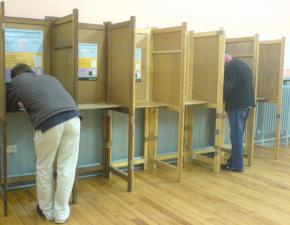The poll tax is back in Texas
Texas' voter ID law isn't to stop fraud, but to stop voting, writes .
THE U.S. Supreme Court has cleared the way for implementation of a Texas voter identification law that could mean hundreds of thousands of Blacks and Latinos will lose the vote.
The law, which requires that voters have an approved photo ID in order to case a ballot, is nothing less than "an unconstitutional poll tax," in the words of Nelva Gonzales Ramos, the U.S. district judge who struck down the law on October 9. A few days later, a federal appeals court blocked Ramos' decision. The Supreme Court a week later rejected an emergency appeal made by opponents of the law, clearing the way for it to be enforced in the upcoming vote in November.
During the Reconstruction-era South of the late 19th century, after the defeat of the Confederacy in the Civil War, the Northern government all too briefly enforced basic rights for freed Black slaves--who, given a chance to participate in politics on an equal footing began to win local, state and even national office. But the racist Southern establishment fought back, passing Jim Crow laws to throw up obstacles to Blacks' ability to vote.
Between 1890 and 1910, laws passed under white-dominated legislatures in the South effectively disenfranchised Blacks and poor whites from the electoral process. Among the tools were poll taxes as well as strict literacy, residency, property ownership, education and "moral character" requirements. Within a decade, almost all Blacks were scrubbed from the voting roles, along with large numbers of poor whites.
Texas instituted its poll tax in 1902, mandating that voters pay a registration fee--residents had to present their receipt to cast a ballot. According to testimony heard by the Supreme Court a few years ago, the fee amounted to about $15.48 in today's dollars--at the time, it was most of a day's wages for Black and Mexican workers.
It took the civil rights movement of the 1950s and '60s--and pitched battles with the latter-day enforcers of Jim Crow in the South--to win passage of the Civil Rights Act of 1965 that put an end to these restrictions that purposely limited the voting rights of Blacks.
Under the new law, now sanctioned by the highest court in the land, in order to cast a ballot at a polling place in Texas, voters will be required to show one government-issued photo identification document from a very short list. For those who don't have this form of ID, they can be a bureaucratic nightmare to obtain. And they cost money. For example, obtaining a birth certificate can cost between $22 and $47--once again the better part of a day's wages for a low-wage worker.
According to Ramos, 608,470 registered voters in Texas--some 4.5 percent of all registered voters--didn't have the voter ID they would need to be able to cast a ballot under the new law. Black voters were three times as likely as whites to not have a voter ID. Latinos were twice as likely.
Obtaining identification also imposes special difficulties on potential voters who don't live near a government office. An "election identification certificate" is available from the Texas Department of Public Safety, but more than 400,000 eligible voters would face round-trip travel times of three hours or more to get one, according to estimates.
Republican supporters of laws like the one in Texas argue that they prevent voter fraud. But they don't prevent voter fraud--they prevent voting.
First of all, these laws affect in-person voting, which statistics show is virtually free of fraud. Not so for mail-in absentee ballots--they are a much more common source of fraud.
According to an analysis by News21, a journalism project at Arizona State University, there were only 28 convictions for vote fraud anywhere in the U.S. since 2000. Of those, 14 percent involved absentee ballot fraud. Voter impersonation, which voter ID laws are supposed to prevent, made up just 3.6 percent of all cases.
Despite the fact that in-person voting fraud is almost nonexistent, this is exactly what the voter ID laws target. And that means disproportionately affecting people of color.
According to an analysis by Michael McDonald, a political science professor at the University of Florida, cited in a recent Frontline report, in 2012, nearly half of mail-in voters were aged 60 and older, and more than 75 percent were white. They were also more likely to vote Republican. Blacks make up about 13 percent of the U.S. population, only 8 percent of them voted by mail in 2012. They largely vote Democratic.
Like the poll tax of old, these new laws are curbing voting by people of color. According to a study by the Government Accounting Office, in Kansas and Tennessee, where new voter ID laws were enacted in 2012, turnout decreased disproportionately among young registrants, those who had been registered for a year or less and African Americans.
Anyone who believes that discrimination at the polls was settled back in the 1960s should take a look at the voter ID laws now in existence in 31 states. In each of these cases, the laws have little to nothing to do with preventing "fraud"--and everything to do with playing politics with African Americans' right to vote.
And now they can do so with the blessing of the U.S. Supreme Court.



